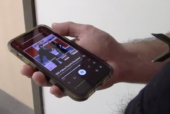Thousands have made their way to the streets of Los Angeles in recent weeks to show support for Armenians fighting in an armed conflict more than 7,000 miles away.
The hostilities involve Armenia and neighboring country Azerbaijan, who are fighting for control over the Nagorno-Karabakh region. (Many Armenians often refer to the disputed are by its historical name, Artsakh.)
Southern California is home to the most ethnic Armenians of any region outside Armenia itself. Los Angeles has seen multiple pro-Armenia protests since late September.
Protesters are marching in hope of getting major news outlets to cover the conflict in Artsakh.
Many have also called on the U.S. to step in — even if it strains America’s relationship with Turkey. Turkey is currently in support of Azerbaijan.
At one recent protest, hundreds gathered outside the Turkish consulate in waving flags and signs in support of the Armenian cause.
“All we want is for the war to end,” said Harout Agzikyouchoukian, a pro-Armenian protester. “In regards to how [the war] makes me feel, at first it made me devastated. It made me feel sad for my people, but now as time goes by you get angry.
“I can’t believe,” Agzikyouchoukian added, “the world doesn’t want to interfere with this war,’ because we have superpower countries that could end this today if they really wanted to. The U.S.A. has the power to do so.”
For many Armenians, this conflict is a fight for survival.
“By terrorizing the population, by using international band cluster bombs on civilians, it makes it clear that [Azerbaijan] wants that territory free without Armanians inside it,” said Syuzanna Petrosyan, associate director of the University of Southern California’s Center for Armenian Studies.
Nagorno-Karabakh “is an unrecognized state,” Petrosyan added. “It does not get the advantages as everything else that countries get such as passports, […] its universities are unaccredited, and it cannot be part of international state treaties, security treaties, etcetera.”
For years, Armenians have protested peacefully in the U.S. to raise awareness of the 1915 Armenian genocide.
“Many Armenians are pretty well known to marching,” said Nzhde Avag-Petroysan. “The cops are really used to us marching on the streets, taking over and shutting down sections of Los Angeles.”
Avag-Petrosyan says the U.S. bears some moral responsibility for the conflict; the U.S. government has aided the militaries of Turkey and Azerbaijan.
“Without proper funding from the outside government,” Avag-Petrosyan said, “I think Azerbaijan and Turkey wouldn’t have the incentive of trying to take over.”

 Tweet this Video
Tweet this Video Share on Facebook
Share on Facebook Share via E-mail
Share via E-mail

